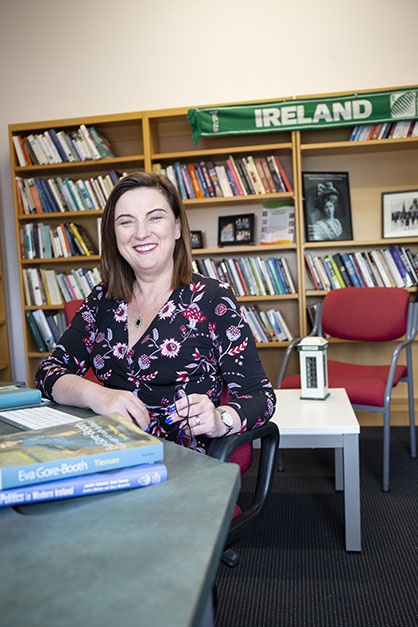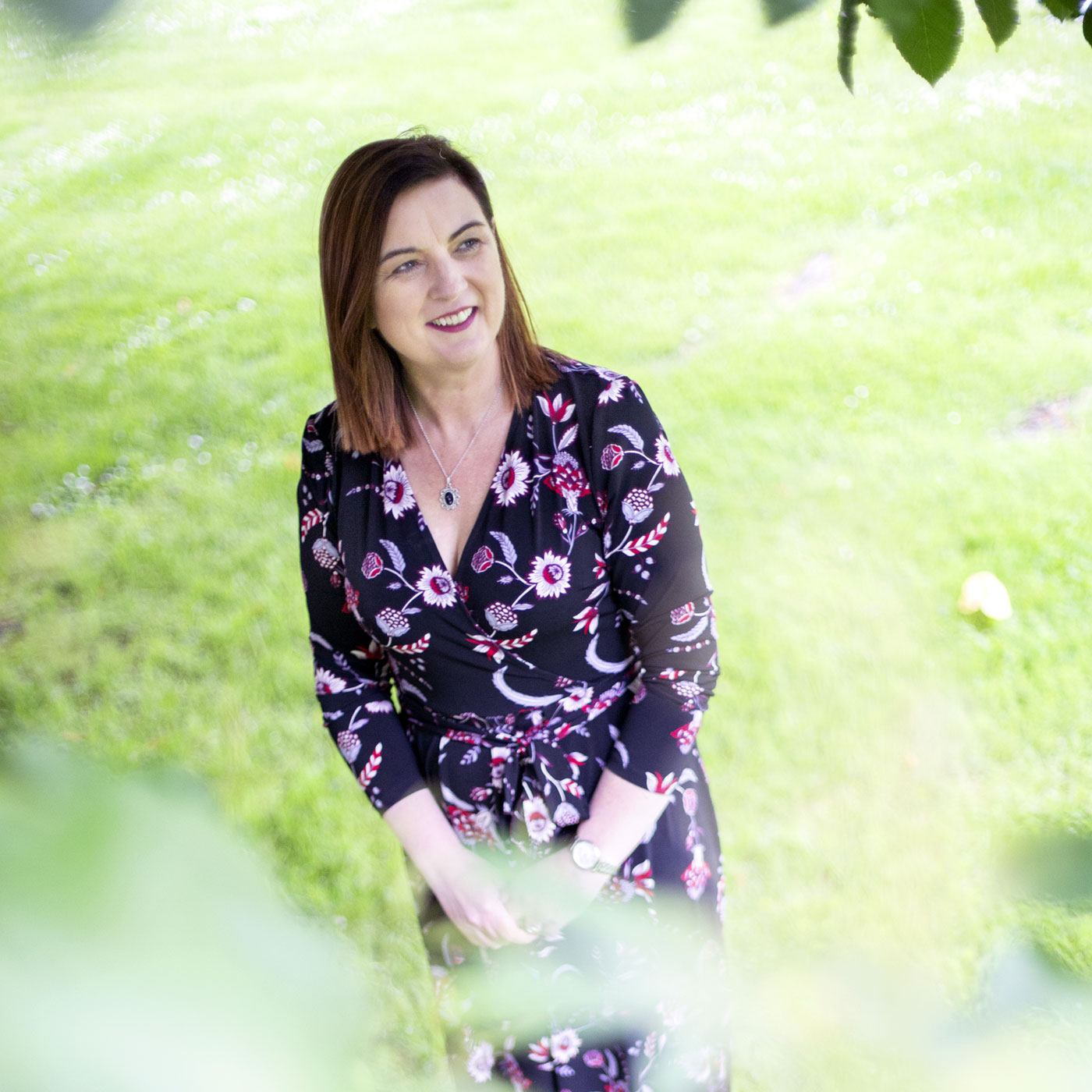Luck
of the
Irish
The new Éamon Cleary Professor of Irish Studies shares her vision for the position and explains why people are increasingly looking to Ireland for the answers to current global issues.
When Professor Sonja Tiernan received an email from the other side of the world inviting her to interview for the Éamon Cleary Chair of Irish Studies at the University of Otago, she was sure it was a scam.
Tiernan, originally from Dublin, was Head of the Department of History and Politics at Liverpool Hope University at the time.
“You don't realise that you can get a life-changing email out of the blue,” she says. “In the beginning you think 'This is some kind of a scam'. But it wasn't. I came out here for the interview process and loved the University, the people I met and Dunedin.”
Tiernan took up her new post last June following the retirement of Professor Peter Kuch, the inaugural holder of the chair. She joins Professor Liam McIlvanney, who holds the Stuart Chair of Scottish Studies, as co-director of the Centre for Irish and Scottish Studies (CISS).
“One of the biggest things I like about Irish Studies is that it doesn't box me in to one particular research area,” Tiernan says. “It doesn't say 'Right, you're a historian, stick to what you know'. It's a cross-discipline approach to better understanding issues that are of prime global importance now. Issues such as colonisation, famine, rebellion, civil war, nationalism, unionism, economic booms and recession, waves of emigration, sectarianism, civil rights, gender equality.
“Most recently, academics and political commentators have noted the obvious parallels between the ongoing refugee crisis and the Great Irish Famine of the mid-19th century.”
Tiernan's plans for her new role include broadening Irish Studies to reflect a rapidly changing Ireland.
“Ireland is a country that has experienced so much hardship and yet is now a prime example of a country capable of rapid social reform. This makes Irish Studies relevant and exciting to study.
“I'm not leaving the traditional approach to the study of Irish literature, culture and history behind, because that remains important. But I like the idea of showing people that Ireland is actually a very progressive country now, which isn't what instantly springs to mind when people think about Ireland.
“Whether it's through study, public outreach, community events, or research... I can see the evidence of the significant connections between these two countries. It's a positive story, worth telling.”
“Students expect evolution as well. Postgrad students are coming to me to discuss research topics from hunger strikes during The Troubles in the north of Ireland to modern Irish feminist literature. There's literally a full range of interests.”
Tiernan is teaching through the History programme this semester, including a module on Capital Punishment in the British Empire, which includes a focus on the use of execution to control and rule in the colonies. She has recently designed a 400-level paper that will be available through Gender Studies entitled Sexual Politics in Modern Ireland, which is based on her research on the history of social reform movements in Ireland.
She is currently designing other papers, including one on public history and commemoration connected to the establishment of the Irish Free State in 1922.
Tiernan and McIlvanney are also working to create a number of teaching options for the centre that will maximise their complementary research specialities, such as developing postgraduate papers together.
“One idea is a paper on Crime and Punishment: Fact and Fiction, through which I can provide the historical background of criminal cases and Liam can follow through with the literature that emerged from such cases. So it might be, for example, Dame Fiona Kidman's award-winning book This Mortal Boy based on Albert Black, a man from Belfast who was the second-last person to be executed here in New Zealand.
“The other side of teaching is supervision, which is a real strength at CISS,” says Tiernan. “First of all you've got myself and Liam and then we've got visitors coming through like esteemed crime fiction author Val McDermid, who's a visiting professor at our centre for three years.

“The centre is also introducing a writer's fellowship that will alternate between a Scottish writer this year followed by an Irish writer in 2021, which will continue for 10 years. So we'll have some really exciting people here who will be available for our students to consult. To get that speciality for students, I think, is pretty unique.
Tiernan's own research interests have evolved since moving to New Zealand. While she continues to work on her existing projects, which include books on Ireland's 2015 marriage equality referendum and on great speeches by Irish women, she is now also the research lead on a project mapping Irish communities and people of Irish heritage in New Zealand. The project, which is the first to cover an entire country, is funded by the Department of Foreign Affairs in Ireland through the Irish Embassy in Wellington.
“The Irish Embassy opened here just before I arrived so it was such good timing for me and also highlights the increasing connections between Ireland and New Zealand,” she says. “It's lovely really, like the stars aligned that all this happened.”
Tiernan will use immigration figures and online surveys to gather information for the project, which could then inform future research and increase connections among Irish migrants, community groups and government representatives, she says.
“Immigration figures show that there has been an increase of nearly 14 per cent of Irish-born people moving to New Zealand last year from July 2018 to June 2019. And I was one of them!”
Tiernan offered an update on this project at the first of a series of monthly public talks at Toitū Otago Settlers Museum in February. The Luck of the Irish series continues throughout the year, on the first Sunday of every month, featuring talks by academics and fiction writers on a variety of topics connecting Ireland and New Zealand.
“Everything from Rosaria Hall – an Irish woman who came from Bantry Bay in Cork and was 'the' fashion designer in New Zealand in the '60s – through to Irish-born poet and politician Thomas Bracken.”
Tiernan is keen to provide further opportunities for community engagement: CISS hosts regular Irish and Scottish film nights and last year it marked its 10th anniversary with the Celtic Noir Crime Writing Festival featuring top Irish, Scottish and New Zealand authors.
She is also on a mission to reclaim Halloween, which originated from a Celtic festival called Samhain and is one of the most important events in the ancient Celtic calendar.
“In 2019, we had an event at the Dunedin City Library on Halloween night. Cherry Smith, a northern Irish poet, performed Famished, centred on the great famine in Ireland. And we had fire dancers, which sounds funny – to have fire dancers in a library – but Samhain is a fire festival.
“To me it's all about carving out more of a recognition of the connections between Ireland and New Zealand. That really is the key thing. Whether it's through study, public outreach, community events, or research... I can see the evidence of the significant connections between these two countries. It's a positive story, worth telling. Watch this space.”
Laura HewsonFor more information on the Centre for Irish and Scottish Studies and to access the survey on Irish people in New Zealand go to otago.ac.nz/ciss
Professor Sonja Tiernan: “I like the idea of showing people that Ireland is actually a very progressive country now, which isn't what instantly springs to mind when people think about Ireland.”
Photos: Alan Dove
